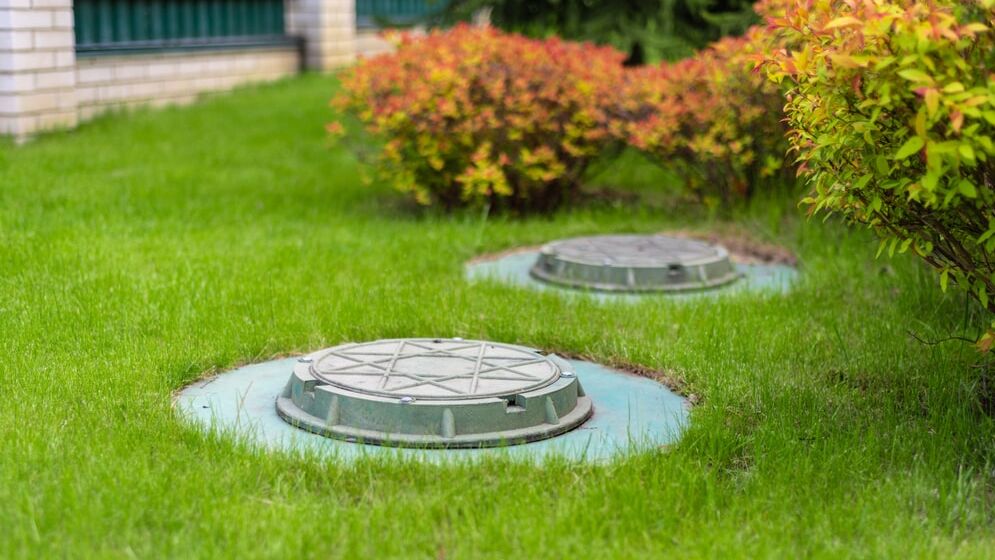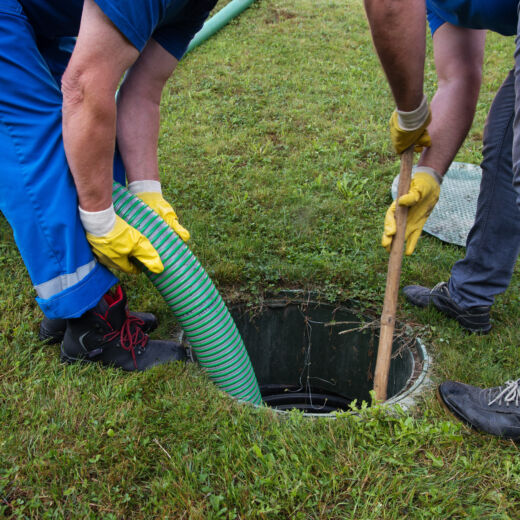If you have a septic system, understanding the basics of how your septic tank and septic system work will help you prolong its life. Septic systems should last between 20-40 years – however, we’ve seen systems that need a replacement before they can see their full lifespan. Many serious septic system issues can be avoided with proper care and maintenance, including keeping up with routine septic system inspections, calling for septic system repairs as soon as there is an issue, and knowing what not to drain or flush.
How a septic system works
Homes that aren’t connected to a city sewage line rely on septic systems to safely treat wastewater. Although a septic system has many different parts, all septic systems consist of two main components: the septic tank and the drainfield. There are different types of septic systems, but in this article, we’ll discuss a standard septic system which is the most common for rural Alberta households.

In a standard septic system:
- Wastewater that is flushed or drained from the house travels into the septic tank
- The septic tank holds and treats the wastewater (more on this process below)
- The wastewater travels to the drainfield
The drainfield consists of perforated pipes or drain tiles that sit about one to three feet below the surface. The soil and microbes act as a natural filter for the water that travels out of the pipes and further cleans the water so it can safely go back into the ground without harming the public and the environment.
How a septic tank works
The septic tank is an underground box where all wastewater from the home is held. It’s typically made of concrete, polyethylene, or fibreglass and comes in varying sizes. The right size depends on the household’s budget for a new septic tank installation and the home’s occupancy.
As wastewater sits in the tank, the oils and grease rise to the top (known as scum), and the solids sink to the bottom (known as sludge). In the middle is relatively clear water that flows out to the drainfield for further treatment. Septic tanks are typically pumped every few years, and the waste is taken to an authorized disposal facility.
Protecting your septic tank and system
Problems with the septic tank and overall septic system can cause wastewater to flow back into the home or water to pool around the drainfield. As you can imagine, this can become an urgent health and safety issue for your household, the public, and the environment. While septic system service is available to repair and remediate these problems, prevention is key.
To protect your septic tank and system, never flush or drain non-biodegradable items, including:
- Diapers
- Sanitary napkins and tampons
- Condoms
- Cigarette butts
- Wipes
- Harsh chemicals
- Dental floss
- Paper towels
- Plastics
- Cosmetics
As a rule of thumb, nothing but natural waste and toilet paper made to degrade in water should be flushed or drained into the septic tank.
When hosting parties or having a family or friend stay over, we recommend letting them know that your home runs on a septic system and not to flush or drain anything. You can place signs in the bathroom and kitchen area as a reminder for your guests.
We recommend installing a septic tank alarm, which will alert you when the water levels in the tank reach an unusually high level. When a septic tank alarm goes off, you have time to address the issue before it becomes a more serious problem.
Last but not least, always follow the recommended annual septic tank inspection, which will ensure the health of your entire septic system, identify potential issues, and prevent potentially devastating problems.
Where to find emergency septic tank and system services
SepTech Canada specializes in repairing residential septic systems in the counties of Strathcona, Sturgeon, Beaver, Camrose, Leduc, and Parkland. Whether your septic alarm has been triggered or you notice some early warning signs of a septic system problem, give us a call, and we can help




